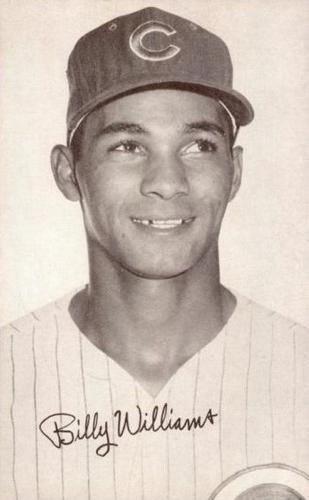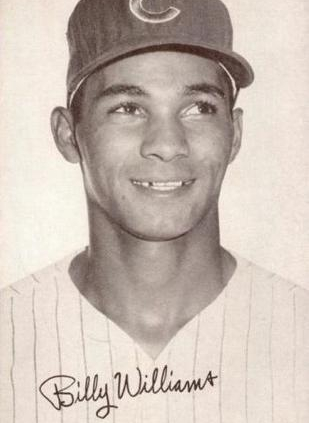October 1, 1960: Billy Williams launches first homer of Hall of Fame career
 Chicago Cubs rookie Billy Williams helped his team avoid a dubious distinction on October 1, 1960. Williams’s first major-league home run – a two-run blast at Los Angeles’ Memorial Coliseum – gave the Cubs a three-run lead over the Los Angeles Dodgers in the top of the ninth inning. The Dodgers tied the score in the bottom of the ninth, but the Cubs scored twice in the 14th inning for a 10-8 win, their 60th of the season against 93 losses.
Chicago Cubs rookie Billy Williams helped his team avoid a dubious distinction on October 1, 1960. Williams’s first major-league home run – a two-run blast at Los Angeles’ Memorial Coliseum – gave the Cubs a three-run lead over the Los Angeles Dodgers in the top of the ninth inning. The Dodgers tied the score in the bottom of the ninth, but the Cubs scored twice in the 14th inning for a 10-8 win, their 60th of the season against 93 losses.
Only one Cubs team or a predecessor in the twentieth century had won fewer than 60 games: the 1901 Orphans, who played only 140 games. Williams was on his way to 426 career homers and a spot in the National Baseball Hall of Fame.
It was the next-to-last day of the 1960 season. The race between Dodgers first baseman Norm Larker and Pittsburgh Pirates shortstop Dick Groat for the National League batting title occupied most Los Angeles fans’ attention. Groat, who missed most of September with a broken left wrist, ultimately had the higher average, .325, to Larker’s .323.1
The Dodgers, coming off a World Series championship in 1959, were in fourth place with an 81-71 record. The previous day, they had broken the NL single-season attendance record during their 7-5 win over the Cubs. The 14,205 attendance for the Friday night game boosted LA’s attendance at home to 2,218,936, topping the old record of 2,215,404 set by the Milwaukee Braves in 1957.2
Another 18,817 fans showed up on Saturday night for a matchup of 20-year-old pitchers. Los Angeles right-hander Phil Ortega was making his first major-league start and third appearance. For the Cubs, who were in seventh place, 34 games behind the first-place Pirates, lefty Dick Ellsworth brought in a 7-13 record and a 3.62 ERA in 30 games, including 26 starts.
The 22-year-old Williams was batting third and playing left field for the Cubs after his September call-up from the Triple-A Houston Buffs. In the first inning of the previous night’s game, he had delivered a two-run triple. It was the second year in a row that the Cubs had given the Whistler, Alabama, native a late-season shot in the majors.
Former Dodger Don Zimmer’s two-run home run with one out in the third inning gave the Cubs a 2-0 lead against Ortega. The Cubs forged ahead 6-0 in the fourth inning. Ron Santo – in his first season as a major leaguer – singled to lead off the inning and scored four batters later when Ellsworth reached base on a fielder’s choice after a sacrifice. The next batter, Richie Ashburn, singled to drive in 18-year-old Danny Murphy, who had reached base on a force out. Zimmer’s single then scored Ellsworth and knocked out Ortega. Ashburn scored the fourth run of the inning when he came home on Williams’s groundout to first.
The Dodgers narrowed the deficit to 6-2 in the bottom of the fourth on Bob Lillis’s bases-loaded double that scored Willie Davis and Frank Howard. Los Angeles scored three more times in the sixth to cut Chicago’s lead to one run at 6-5. Ron Fairly scored on Doug Camilli’s single off reliever Joe Schaffernoth; Lillis came home on Maury Wills’ base hit; and Camilli, who went 4-for-7 in his sixth big-league game, scored when reliever Don Elston walked Howard with the bases loaded.
It was still a one-run game going to the top of the ninth. Los Angeles’ Sandy Koufax, who had split his sixth major-league season between starting and relieving, threw two scoreless innings in the seventh and eighth. The Dodgers pinch-hit for Koufax in the eighth, and Stan Williams came in for the ninth.
Al Heist singled to lead off the ninth, took second on a wild pitch, and moved to third on Jerry Kindall’s sacrifice, bringing up Billy Williams.
“Stan’s first pitch was low and away. ‘Get around on it,’ I told myself,” Williams recalled 10 years later. “The second pitch caught the inside corner. I knew I should swing at the next one. I guess it was instinct. As he started his windup, I started my stride. The ball whistled toward me. I spun around and caught it solidly. I knew it was well hit, but I was surprised to see it sail far across the fence.”3
The Dodgers battled back in the bottom of the ninth and tied the score. Larker’s sacrifice fly off reliever Mel Wright brought home Lillis with no outs; John Roseboro’s fly off reliever Glen Hobbie scored Camilli; and Willie Davis added a run-scoring single with two outs.
Neither team scored in the next four innings against Dodger Roger Craig and Chicago’s Hobbie, but catcher Camilli’s mishandling of a foul popup gave the Cubs the opening they needed against reliever Ed Palmquist in the 14th inning. Given new life, Frank Thomas walked. After Santo and pinch-hitter Sammy Taylor struck out, Lou Johnson singled. Pinch-hitter Grady Hatton, appearing in the final game of a 12-season major-league career, also singled, driving in Thomas with an unearned run.
Heist walked to advance Johnson to third and Hatton to second. Johnson then scored the Cubs’ second unearned run of the inning on Jim McKnight’s two-out single. Palmquist finally retired Williams to quell the uprising.
The Cubs’ sixth pitcher, Bob Anderson, retired the Dodgers in the bottom of the 14th as Willie Davis struck out, Howard flied out, and Tommy Davis grounded out. Palmquist was tagged with the loss, his only decision of the season, after giving up three hits and two runs (both unearned), walking two, and striking out two.
The two teams combined for 18 runs, 33 hits, and six errors (five by the Cubs), and left 32 runners on base. Forty-five players were used in the game, which lasted 4 hours and 54 minutes. Lillis and Wills collected five hits each for the Dodgers; Heist, Williams, and Zimmer had two each for the Cubs.
Williams hit the second homer of his career the next day in the Cubs’ 4-3 loss to the Dodgers. The slender slugger went 13-for-47 in 12 Cubs games with 2 homers, 2 triples, and 7 RBIs in 1960. He went on to win the National League Rookie of the Year Award in 1961 with a .278 batting average, 25 home runs, and 86 RBIs. His Cubs rookie record of 25 homers stood until Kris Bryant hit 26 in 2015. “I believe he’s going to win the batting championship and he’ll rank as one of the greatest in the game,” teammate Ernie Banks predicted after the season. “He’s got that confidence and that is more than half the battle at the plate.”4
Williams hit 20 or more homers for 13 straight seasons and finished with 392 of his 426 homers with the Cubs, the third most in franchise history. He played in a National League record 1,117 consecutive games from September 22, 1963, to September 2, 1970, a record that lasted until Steve Garvey played in 1,207 straight games with the Dodgers and San Diego Padres from September 3, 1975, to July 29, 1983. Williams was elected to the Hall of Fame in 1987, the same season that the Cubs retired his number 26.
“Billy was one of the sweetest-swinging left-handed hitters I’ve ever seen,” his teammate Santo said. “He had such quick hands, a lot like Ernie [Banks]. You know, Billy was quiet, but he spoke his mind. He was a leader. He wasn’t a guy to just sit back.”5
The 1960 season started and ended oddly for the Cubs. Broadcaster and former American League MVP Lou Boudreau replaced Charlie Grimm as the team’s manager 18 games into the season and Grimm took Boudreau’s place in the WGN radio booth.6 At the time, Boudreau said, “That Billy Williams in left field has the hitting potential to be another Ted Williams.”7 Two days after the season ended, Cubs owner Philip Wrigley refused to give Boudreau a three-year contract and Boudreau returned to WGN.
“I certainly understood Lou’s position. He wants security and we can’t give it to him,” Wrigley said. “The best protection we can give our managers is to advise them to get out of baseball.”8 However, Wrigley asked Boudreau to remain as an adviser to the big-league club, which he did. Grimm became a full-time vice president and managed Cubs prospects in the new Arizona Instructional League that winter.9
The early to mid-1960s were a tale of two cities for each team. The Cubs established a college of coaches in 1961 in which several coaches rotated as head coach throughout the season. The new system did little to improve the Cubs’ fortunes: They finished 353-449 during 1961-1965 under Vedie Himsl, Harry Craft, Lou Klein, El Tappe, Charley Metro, and Bob Kennedy. In 1966 the Cubs under manager Leo Durocher finished 59-103 for the second time in five years. They improved to 87-74 the next season under Durocher, which started a string of pennant-contending seasons.
The Dodgers compiled a 467-338 record during 1961-1965 (with three ties) and won two World Series under manager Walter Alston. After calling Memorial Coliseum their home for four seasons, the Dodgers moved into Dodger Stadium for Opening Day 1962.
Acknowledgments
This article was fact-checked by Ray Danner and copy-edited by Len Levin.
Sources
In addition to the sources listed in the Notes, the author used Baseball-Reference.com, Newspapers.com, Retrosheet.org, the 1962 Chicago Cubs Official Press TV Radio Roster Book, and the 2015 Chicago Cubs Media Guide.
https://www.baseball-reference.com/boxes/LAN/LAN196010010.shtml
https://www.retrosheet.org/boxesetc/1960/B10010LAN1960.htm
Photo credit: Billy Williams, Trading Card Database.
Notes
1 Groat suffered the broken wrist when he was hit by a pitch from Lew Burdette of the Milwaukee Braves in the Pirates’ 5-3 victory over the Braves at Forbes Field on September 6, 1960. Groat collected two hits in five at-bats when he returned to the starting lineup on October 1.
2 Al Wolf, “Dodgers Win, Set Attendance Mark,” Los Angeles Times, October 1, 1960: 15.
3 Billy Williams with Rick Simon, Iron Man (Chicago: Children’s Press, 1970), 53-54.
4 Eddie Gold and Art Ahrens, The New Era Cubs 1941-1985 (Chicago: Bonus Books, 1985), 130.
5 Les Krantz, Wrigley Field: The Centennial 100 Years at the Friendly Confines (Chicago: Triumph Books, 2013), 87.
6 Boudreau worked for WGN Radio from December 1957, to May 4, 1960, when he became the Cubs’ manager. He had previously managed the Kansas City Athletics.
7 Charles Bartlett, “WGN Shouts ‘Welcome’ to Boudreau,” Chicago Tribune, October 5, 1960: 51.
8 Cooper Rollow, “Boudreau Quits Cubs, Rejoins W-G-N,” Chicago Tribune, October 5, 1960: 51.
9 Grimm also managed the Cubs from 1932 to 1938 and from 1944 to 1949. He compiled a 946-782 managerial record (.547).
Additional Stats
Chicago Cubs 10
Los Angeles Dodgers 8
Los Angeles Memorial Coliseum
Los Angeles, CA
Box Score + PBP:
Corrections? Additions?
If you can help us improve this game story, contact us.


